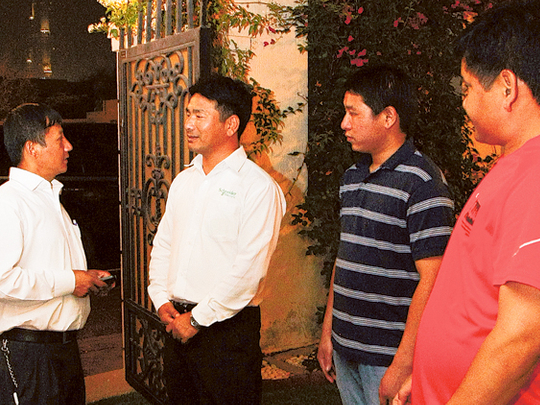
Dubai: Following the avalanche in Nepal which claimed the lives of 15 sherpas, the community here is sad and angry over the treatment meted out to their people.
In an interview with four members of the Sherpa community employed here, Gulf News learnt how tough and hard their lives were and their giant contribution to the economy of the mountain kingdom which they feel is being undervalued by their government.
There are approximately 80 sherpas employed in different kinds of jobs ranging from housekeeping, maintenance, logistics and administration, here in the UAE. Sherpas are traditionally the mountaineering community of Nepal living in the North Eastern side at the foothills of the Himalayas.
“Tourism is the backbone of the economy of Nepal and we Sherpas play a very significant part in making it successful. Nearly 75 per cent of our community is involved in mountain climbing and associated professions,” says Furi Sherpa, 38, who belongs to the Mapun Village in the Solu Khombu district made famous by Mount Everest. He was a tourist guide for the Himalayas from 1996 — 2005 and would take international mountaineers up to the Everest base camp. He has done altitudes of 6000m, however, he moved to Dubai in 2006 when business was thin and is currently employed in the logistics business. Furi analyses what really has gone wrong in the Sherpa community and why more and more members of his community now believe in getting educated and looking for alternative white collar jobs or migrating to more prosperous countries. “In earlier times, after the first flush of success that Tenzing Norgay had, there was a boom in mountain climbing. Our community prospered, many sherpas earned good money, fame and also got to migrate to countries such as New Zealand, USA, Canada where they got employed into adventure sports business. Sherpas quite naturally climb mountains and naturally veer to tourism, hospitality, portering and other such businesses. However, in the nineties the rise of Maoism served a death blow to tourism. In that decade many tourism companies closed down and Sherpas were forced to take to farming and other alternative jobs. Our generation of children moved to boarding schools to study and very few took to mountain climbing. Many of us moved out of Nepal,” he says.
Nabin Sherpa, 38, who has been in Dubai for the last 15 years and hails from the Lingtep II village in Taplegunj district close to the Kanchenjunga peak, feels despite all modernisation, the lives of Sherpas continues to be tough and while the government earns huge revenues, their community just manages to eke a living and get a raw deal.
“We Sherpas take a lot of pride in our work and mountain climbing is a way of life us. Every Sherpa kid climbs at least a small mountain as a child. Sherpas earn a decent amount of Dh36,000 per climb which lasts for 3 months and they usually manage two climbs in the season. However, they usually have large families depending on their livelihood. Their work is very tough as they have to manage a mountaineering team of at least seven people. There are porters who earn a meagre Nepali Rs1000 per day (Dh50) but these also accompany them until the base camp. After that, the core team has to work hard to clear pathway, use icepicks and chisels to make new paths, cook and also manage first aid etc for the team. Poor nutrition, hardy life, climbing so often to high altitudes in thin oxygen, takes a toll, but they have not many alternatives,” says Nabin who never really took to mountain climbing although he has many uncles and cousins in the profession.
Sange Sherpa, 42, feels outraged that despite their hardships their government has adopted such a lackadaisical attitude.
“What has really angered us over this avalanche incident is not the actual accident itself. Avalanches are a common occurrence in the snow clad regions, However, the Nepal Tourism Board, which mandatorily collects a fat royalty fee of $50,000 (Dh180,000) from each mountaineering team of seven members and collects much more cash for garbage clearance deposit etc, actually offered the next of kin of the deceased only 40,000 Nepali rupees (Dh2000). This amount was barely enough to cover the funeral expenses, With pathetic insurance covers, the families of the deceased sherpas who very often had only one breadwinner, have been left to fend for themselves. Frankly speaking the government pays handsome rewards to sports stars. Isn’t mountaineering an extreme sport so why are our heroes not given their due, “questions Sange who comes from Angdin Gibisa village in the Tehrathum district and works as a messenger boy here in Dubai for the last 12 years.
Whatever professions the Sherpas might diversify to, they will never give up mountain climbing and what we want to the government to do is learn a few lessons from this tragedy,” says Lakpa Sherpa, 23, the youngest of the group who came to Dubai in 2008, at the age of 19 to join the hospitality industry. “We want the government to be a little more compassionate and vigilant, raise the insurance over for Sherpas, give them more professional equipment and better training. This is our work, but our community needs better preparation to handle crisis much more efficiently,” he concludes.








